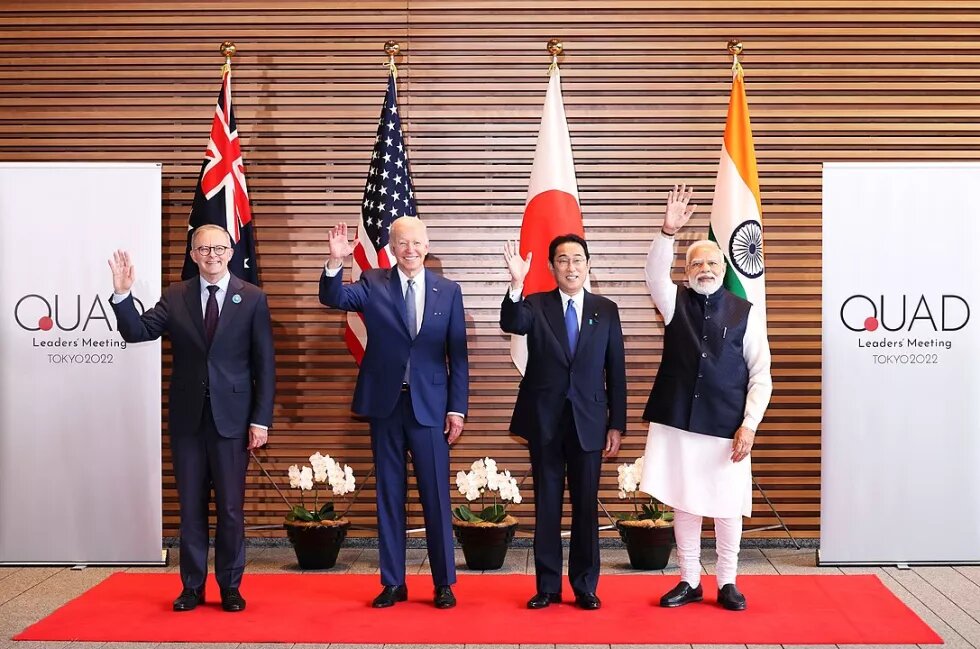Despite external disruptions or bilateral challenges among members, the Quadrilateral Security Dialogue sustains its commitment, setting a precedent for uninterrupted collaboration that ensures continuity and reliability in regional engagements.

The Indo-Pacific has emerged as a theatre for geopolitical competition between China and the West. Although the exact definition of this politico-geographic construct is still being finalised, it is agreed that it covers almost 40 countries, with over four billion people living in them and contributing more than 65 per cent to the global GDP.
These numbers are staggering and require additional responsibility from those who wish to engage in the region, whether to keep it stable, contribute to its economic growth, or assist in managing critical challenges such as climate change and democratic backsliding. Since the Indo-Pacific construct originated in the need to address China's economic, political, and military expansion into the region, Western countries have been the first to respond. Several have adapted their strategic outlooks to include the Indo-Pacific, and some like the US, Germany, France, Japan, the UK, Australia, Canada and the EU have even released stand-alone policy documents.
However, many regional states, especially small and middle-sized economies, have yet to embrace the new Indo-Pacific construct. For them, the shift from viewing the region as Asia Pacific to Indo-Pacific is seen as a means to keep China in check. As these states fear being forced to pick sides while their economies heavily depend on China, they have taken a balanced stand. They prefer the centrality of the Association of Southeast Asian Nations (ASEAN) in any external engagement with the region and find engagement with multilateral or even minilateral groupings safer to secure their needs and interests. This preference for broader multilateral arrangements is also evident among extra-regional powers, which respond jointly to the region's problems. The Quadrilateral Security Dialogue (Quad) formed by Japan, India, Australia and the US is one such multilateral arrangement seeking to engage the region meaningfully.
The Quad and its importance
The Quad has slowly emerged as a significant player in the Indo-Pacific region. Despite its tumultuous past, it has demonstrated the potential of multilateralism to secure public goods for a region that faces several challenges. The origins of the Quad can be traced back to the Tsunami core group, formed to provide humanitarian and disaster relief in response to the 2004 tsunami that devastated countries in the region. However, after this response to a regional crisis, the potential of this group remained untapped until 2007, when former Japanese prime minister Shinzo Abe proposed the Quad as a platform for dialogue between four democracies committed to bringing stability and prosperity to the Asia Pacific region. While the idea was acceptable to policymakers in the four countries, it wasn't until 2017, when the four Quad partners aligned their views on China, that the true potential of the Quad was realised.
Since then, the combined strengths of the four partners have been channelled towards building the bureaucratic muscles necessary to respond to immediate and future crises across sectors. Through six leader-level working groups on issues such as climate, critical and emerging technologies, cyber, health security partnership, Infrastructure, and space, the Quad can show regional players that it is invested in the issues that impact the region. The group has shed perceptions of its China-centrism by consciously focusing on people-centric, non-traditional security threats. In addition, it has launched affirmative initiatives such as the Indo-Pacific Partnership for Maritime Domain Awareness, STEM fellowships, and the Indo-Pacific Economic Framework (IPEF). The nature of issues that the Quad has focused on reflects problems that countries in the region face. This increases the group's importance since existing mechanisms suffer from inaction due to international efforts to decouple from China, and regional mechanisms need more resources to deal with the enormity of challenges by themselves. For instance, the IPEF, led by the Quad, focuses on aligning regional policies on trade, supply chains, clean energy, decarbonisation, infrastructure, and tax and anti-corruption. At the most recent APEC summit in May 2023, of which China is a member, the group could not issue a joint statement, while the barely one-year-old IPEF reached an agreement on supply chains.
The Quad is a significant mechanism not only due to being a group of well-functioning democracies but also owing to its partners' combined economic and geopolitical power. Japan, a traditional development and trade partner of most Indo-Pacific countries, can leverage these relationships as a gateway for the US and Australia to build stronger ties with regional stakeholders. Similarly, Australia, with its traditional maritime role in the region, brings its expertise in maritime security to the forefront. Although the US still lacks sufficient trust among most Indo-Pacific countries, its economic, diplomatic, and military heft provides the necessary support for effectively addressing the region's challenges. India is a crucial piece in the Quad's success story. Its economic growth, non-aligned past, autonomous present, demographic dividend, and developmental challenges create a relatable connection for small and middle-sized states in the Indo-Pacific. Together, the Quad provides an alternative to these states that may be re-examining the extent of their engagement and partial dependence on China.
A tested strategy in a new context
The Quad’s increasing success in establishing itself as a regional mechanism and an alternative is akin to breaking into a monopolised and unregulated market. It performs two other crucial functions apart from presenting an alternative to China and providing context-based public goods – building stronger bilateral relationships between each of the four members and introducing more equitable norms for external engagement with regional stakeholders. A deeper dive into the Quad’s trajectory over the past six years reveals that when implemented well, core principles of regional engagement can lead to more comprehensive regional participation. Five strategies adopted by the Quad stand out and carry important lessons for others interested in engaging with the region:
i. Context-dependent objectives: The Quad partners have leveraged their joint expertise to service the context-dependent needs of the region. Even in its shape and vision, it has refrained from security-focused initiatives, which could complicate the participation of regional states. While it has responded to regional crises such as the COVID-19 pandemic, it has slowly set its eyes on long-term issues of critical import that are partially felt by some regional states at the present moment. It has also remained flexible in bringing in additional actors through the Quad Plus format for working on specific issues. These choices have allowed the Quad to slowly counter narratives that presented it as a divisive and disruptive grouping. Instead, it has emerged as an affirmative rather than a defensive group, thereby being more inviting to regional stakeholders.
ii. Identifying and building on mutual complementarities: The Quad has built a necessary level of trust among the four partners based on their shared vision and regional concerns. This has meant that the nature of commitments for each partner has been non-binding. This allows for a more functional and agile burden-sharing arrangement where showing up together is considered half the effort. This has also allowed the necessary breathing space for members to adjust their engagements and policies during power transitions and foreign policy reorientations at home. Each of the four members brings a unique set of skills, which could be put to work bilaterally, trilaterally and or together, as per the situation's needs and the comfort of each member.
iii. Ambiguity in form but not action: Unlike many other multilateral arrangements, the Quad has remained informal. It doesn't have a permanent secretariat or does not identify as an alliance of any kind. Yet, it holds regular summit meetings at the highest levels with several regular technical and working group meetings throughout the year. Its purpose has largely remained ambiguous, letting its actions speak instead. This has allowed the Quad to undercut China’s efforts at presenting the Quad as a threat to regional sovereignty. Yet the joint capabilities of all Quad partners, which are honed regularly through bilateral and trilateral military exercises, mean that the Quad could step in to manage a security situation in the region if needed. The Quad's ambiguous yet dual nature has allowed each partner to carefully work their bilateral equations with China based on their constraints and policy realities.
iv. Zone balancing: The Quad has engaged in zone balancing – building the capacity and resilience of third-party states to shrink China’s ability to coerce them. While this has occurred mainly through bilateral and trilateral partnerships among the Quad members and regional states, having an agreement on building indigenous capacity and self-reliance has allowed the Quad partners to align their outreach to regional stakeholders. Geoeconomic and social security have been at the forefront of the Quad agenda. Hence, it has diversified its capacity-building efforts across several sectors – climate finance, green technologies, blue economy, infrastructure and connectivity. All of these together are driven by reducing dependencies on one country or multilateral framework.
v. Consistent engagement: Since 2017, the Quad leaders have ensured that the engagements between the four bureaucracies are consistent. Structurally, these engagements and the Quad framework are not restrictive on any of the partners and their interests in engaging with regional states. Even at the peak of the Russia-Ukraine war, when there were concerns that the US’ focus would move away from the Indo-Pacific, the Quad grouping ensured this did not happen. Similarly, bilateral events such as the allegations of Indian intelligence officials being involved in a plot to assassinate Khalistani ideologue Gurpatwant Singh Pannun, a US national, have not derailed cooperation. Therefore, while the Quad summit, initially planned for January 2024 in New Delhi, may be postponed due to the unavailability of all leaders, it will still happen later in 2024, under the shadow of such developments. This upcoming summit will take stock of the progress made since the last one in May 2023. It will likely focus on critical and emerging technologies, infrastructure, maritime security, health security and critical minerals. On each of these issues, the Quad is likely to progress in fine-tuning its initiatives, assessing current and the necessary levels of investment from each partner, and working out ways of strengthening action on each within or outside the Quad framework.
Lessons from the Quad for others
European stakeholders can learn several important lessons from the Quad's engagement with the Indo-Pacific region. The Quad's nuanced strategy, which involves understanding and addressing regional needs without solely focusing on security concerns, is at the core of its success. This approach promotes inclusivity and relevance, ensuring sustained engagement without creating divisive rifts. The Quad also encourages initiatives that support regional sovereignty and can address security challenges, if needed. European stakeholders must implement their Indo-Pacific visions on these lines.
Consistency in engagement is another pivotal lesson from the Quad's approach. Despite external disruptions or bilateral challenges among members, the Quad sustains its commitment, setting a precedent for uninterrupted collaboration. This steadfastness ensures continuity and reliability in regional engagements. European states must adopt a more pragmatic approach that allows non-binding partnerships not dependent on mandatory alignment on all issues.
In essence, European governments can benefit significantly by adopting the Quad's multifaceted strategies, including contextualising objectives, fostering complementarity, balancing form with action, fortifying third-party states, and sustaining consistent engagement. These lessons provide a roadmap for European nations aspiring to elevate their role in the Indo-Pacific, fostering enduring and inclusive regional participation.


